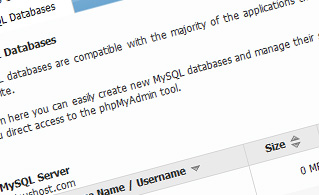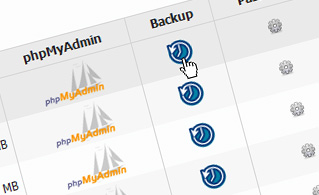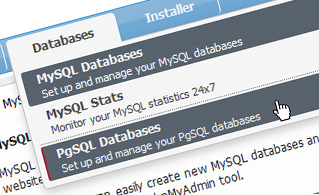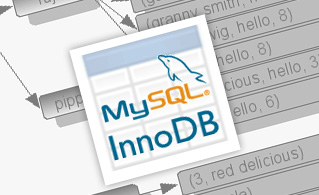Database Manager
The Hepsia hosting Control Panel comprises a full-featured database management GUI, which will give you complete control over your DBs. You can easily create new MySQL and PgSQL databases and administer them via the phpMyAdmin and phpPgAdmin database administration tools respectively.

An Easy-to-Use Interface
With the Database Manager graphical user interface, you can set up a brand new DB in seconds - simply fill in its name and that's all. You will notice a list of all your databases and their respective sizes. You will be able to modify passwords, to create database backups and to even log into the phpMyAdmin and phpPgAdmin database administration tools.

Simple Database Backups
It is quite essential to make regular backups of your DBs to protect your website content and to abstain from any accidental loss of data. With the Database Manager GUI, creating a database backup file is extremely easy. Just click on the Backup icon next to the database you wish to back up and you will be instantaneously taken to the File Manager from where you can download your newly created backup file.

MySQL and PgSQL Databases
The number of PostgreSQL and/or MySQL databases that you can create differs depending on the shared hosting package that you have chosen. While MySQL is a very popular database management system used by 1 000 000's of users all over the globe, PostgreSQL is regarded as being a more innovative database management system and is chiefly employed by tech-savvy website administrators. You can manage your MySQL databases through the phpMyAdmin software tool, while PostgreSQL databases can be managed through the phpPgAdmin tool.

InnoDB Support
InnoDB is the leading transactional storage engine for the MySQL DBMS, which is aimed at securing user data and at enhancing multi-user concurrency and performance. When you want to create a new database table, just log into the Hepsia hosting Control Panel-incorporated phpMyAdmin database administration tool and select the InnoDB storage engine from the list of available storage engines.
More Features
Hepsia's Database Manager section also includes exhaustive stats about your databases, including the number of hourly database requests. This will give you a clue about how much load is created during a specific period of time.